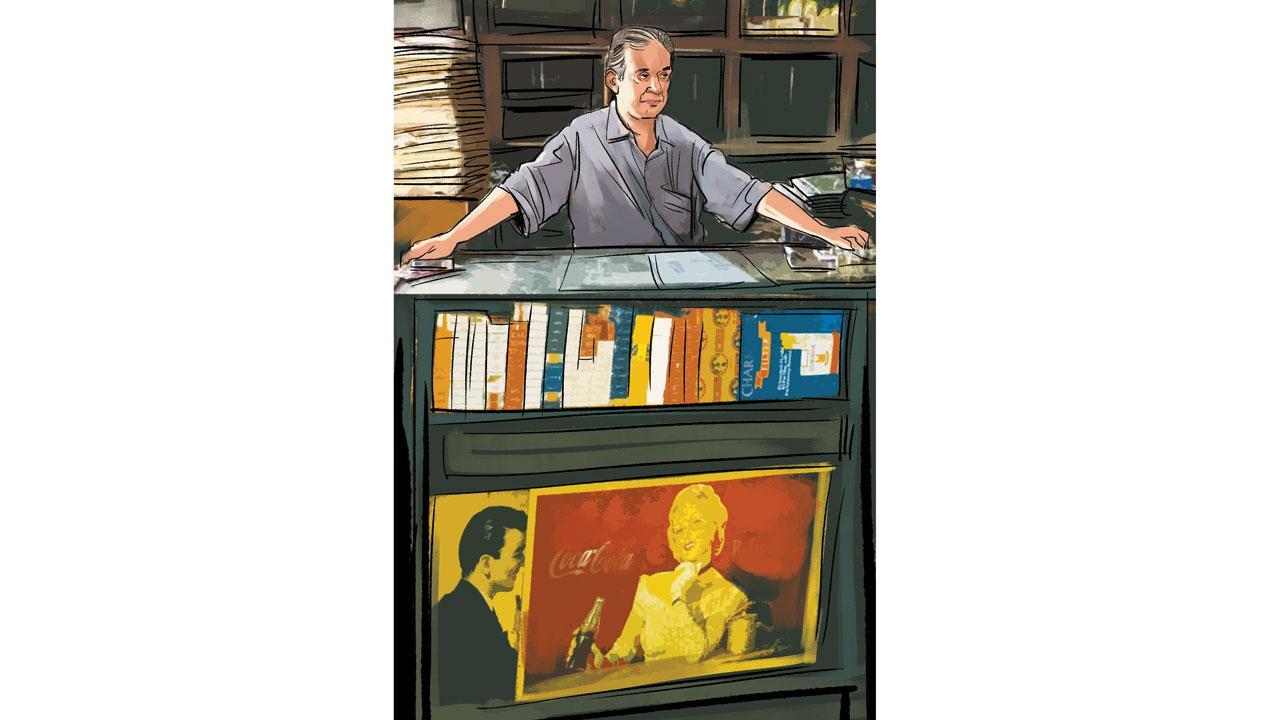Sure, Rashid was a loner, but gosh, how quickly one can be erased from public memory—in your own neighbourhood

Illustration/Uday Mohite
![]() Next week, it will be a year to the most beloved film critic Rashid Irani’s demise. What perturbed me was that the papers reported he “most likely” passed away on July 30, at home! Rashid lived alone among his 5,000 books and movies for much of his adult life—and died alone. A Parsi, he was a partner of Brabourne Restaurant, an Irani restaurant across the street in Dhobi Talao, South Mumbai—and was usually found at its cash counter by day. Cinema and books were his passion, and he wrote some of the finest film reviews by an Indian critic. He was a regular at the Press Club, and when he didn’t turn up for some days, his friends got worried. The police broke down his door and found his body, thus the “most likely” date of his demise was an estimate.
Next week, it will be a year to the most beloved film critic Rashid Irani’s demise. What perturbed me was that the papers reported he “most likely” passed away on July 30, at home! Rashid lived alone among his 5,000 books and movies for much of his adult life—and died alone. A Parsi, he was a partner of Brabourne Restaurant, an Irani restaurant across the street in Dhobi Talao, South Mumbai—and was usually found at its cash counter by day. Cinema and books were his passion, and he wrote some of the finest film reviews by an Indian critic. He was a regular at the Press Club, and when he didn’t turn up for some days, his friends got worried. The police broke down his door and found his body, thus the “most likely” date of his demise was an estimate.
ADVERTISEMENT
The other day, a lovely college friend, Deepa Soman, invited me to catch up with Father Terence Quadros, who was the life and soul of college, at our alma mater, St Xavier’s College. Walking through Dhobi Talao to college, I remembered Rashid and our many addabazi sessions over languid beers at Brabourne Restaurant, with which his family had been associated since 1934. I walked up and down the street a few times, desperately looking for the restaurant, but couldn’t find it. There was Tahir Arms Stores, TG Sports, Vinayak Digital Print, but no Brabourne. Yahan ek Irani hotel tha, kidhar hai? Rashid Irani, ek Parsi chalata tha, I asked frantically. Nahin hai, madam, naam kabhi nahin suna. Hum dus saal se hain. (Nobody I asked had even heard of him or the restaurant). I left heartbroken. (Later Rashid’s friend Rafeeq Ellias told me the Brabourne building was demolished). Sure, Rashid was a loner, but gosh, how quickly one can be erased from public memory—in your own neighbourhood.
I’ve lived alone too—among books and movies—since 15 years. Sure, I’ve had my ups and downs. But lonely? No, I can’t even remember when I last felt lonely. If I have to go right now, I will go gladly, and with a full heart. Once, a friend, Sandesh Kshatriya, told me that when he was young, his single mum had arranged a puja, after his family had been through a rough time, and the priest asked him, what do you wish for? Sandesh said, nothing. No, no, ask, like good job, beautiful wife, big house. “I want nothing. I already have everything I want,” Sandesh shrugged, annoying the priest no end. That fullness of heart is so rare today.
Covid has brutally reminded us of the fragility of life, and I have learnt to delight in the big-small joys of life. Plants on my balcony offering me flowers. I imagine they want to surprise me with flowers held behind their backs, but they simply can’t hide them because their buds take a few days to blossom. The spectacular raintree outside, swarming with chittering squirrels. Tapri chai and nankhatai at the street corner—sweaty rickshawallahs take a slight step back when ‘madam’ joins them. I cherish spending time with Amma, who is 95, and with my friends. Amma and I have been learning a beautiful Tukaram abhang in Marathi together—Lahanpana dega deva, mungi sakharecha rawa (Lord, grant me littleness, the ant is thrilled with a grain of sugar). It is a privilege to work with the Berlin Film Festival and others. And there is also so much richness in living with gratitude and kindness.
So, if you’re going to post nice-nice things about me when I’m gone, forget it! Baad mein mat bolo. Tell me now. Show me now.
Meenakshi Shedde is India and South Asia Delegate to the Berlin International Film Festival, National Award-winning critic, curator to festivals worldwide and journalist.
Reach her at meenakshi.shedde@mid-day.com
 Subscribe today by clicking the link and stay updated with the latest news!" Click here!
Subscribe today by clicking the link and stay updated with the latest news!" Click here!








